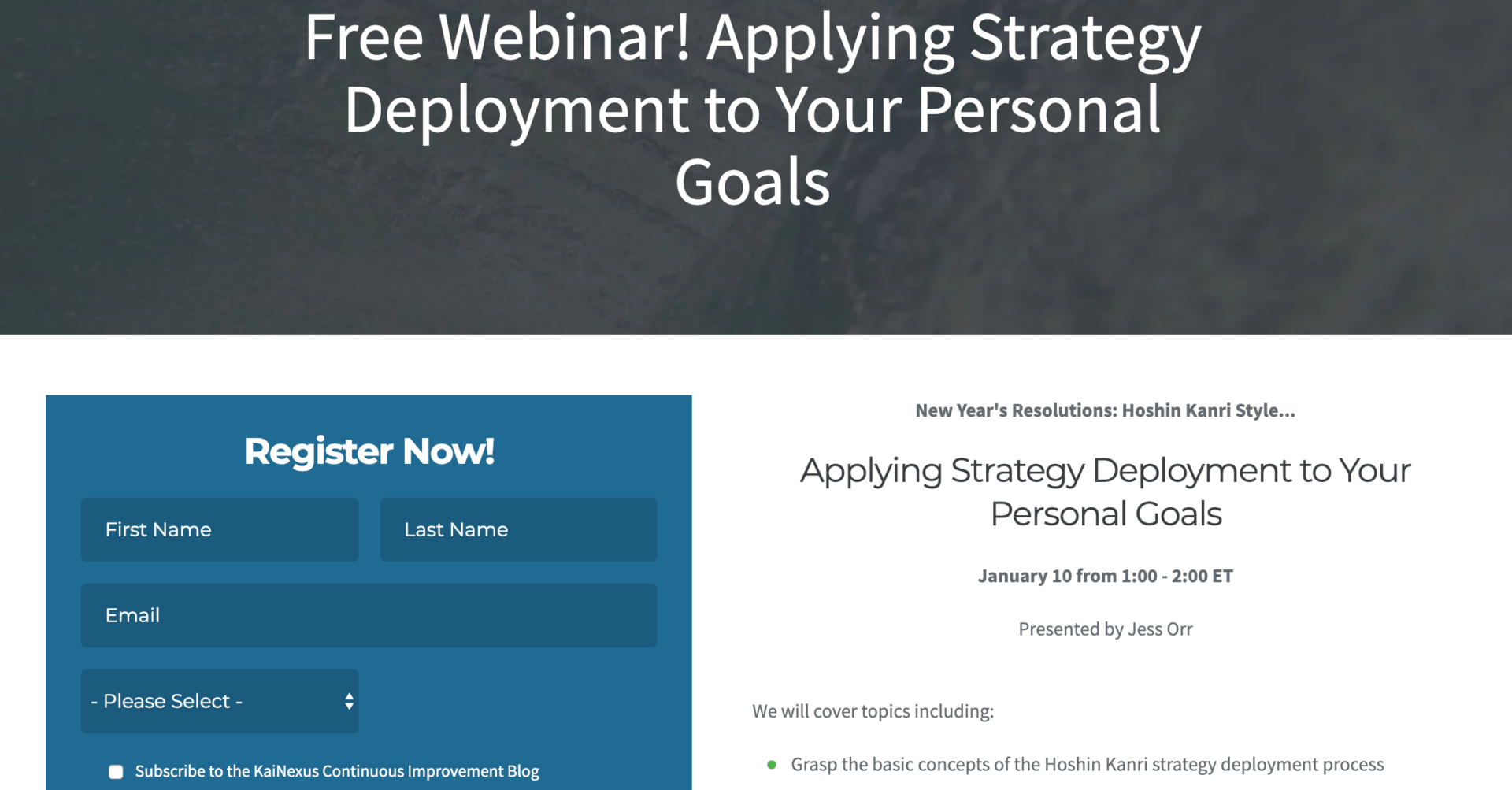Happy New Year! It's a time of year when we think about improvement and goals for the year. We do this in our organizations and we do so on a personal level.
Today's blog post is a transcript of a KaiNexus podcast that I did with Jess Orr (read her LeanBlog.org posts) about a webinar she is presenting on January 10th.
Click to View the Recording:

Listen to the Podcast Preview:
Read the Transcript:
Mark Graban: Hi, this is Mark Graban from KaiNexus. In today's podcast episode, we're joined by Jess Orr. We're going to be giving a bit of a preview for the webinar that she'll be presenting on January 10th, 2019, “Applying Strategy Deployment to Your Personal Goals.”
We're also framing this in terms of, maybe appropriately for January, New Year's Resolutions, Hoshin Kanri style. If you don't what that phrase means, Jess is well positioned to be able to help you understand those concepts.
Jess, thank you for being here. Thanks in advance for doing another webinar for us at KaiNexus.
Jess Orr: My pleasure, Mark. Thank you for giving me this opportunity. I think it's going to be value added for participants.
Mark: I definitely agree. We want to give a bit of a preview and maybe convince people to go and register for the webinar, which you can do, by the way, by going to kainexus.com/webinars.
Jess, for anyone who hasn't checked out the first two webinars that you did for us on the A3 methodology — I would definitely encourage people to go find those in the webinar library or YouTube channel. Jess, could you introduce yourself and tell the listeners a little bit about your career background?
Jess: Absolutely. I'm a continuous improvement practitioner at a company called WestRock. We're a very large paper and packaging organization. I've got about 12 years of experience in continuous improvement in different facets.
Particularly formative for me was the time that I spent working directly for Toyota. I enjoy applying the concepts and principles of continuous improvement in my own personal life, as well. I believe if the tools work there's no reason why they can't work in a variety of applications.
Mark: Personally, I'm a bit… Jealous isn't the right word, but I appreciate that you have that direct experience with Toyota. Whether it's A3, or Hoshin Kanri, or other practices there's, I'm sure, a discovery of the differences between being at a company like Toyota where a lot of this is well grounded and helping other companies either get started or progress in their approaches around A3, Hoshin Kanri, lean in general, right?
Jess: Yeah, and it's interesting. They say, “How does a fish describe water?” That's really what my experience at Toyota was. I understood these things because that was part of the DNA at Toyota.
Really, where I started to more fully understand, and I'm still on that learning journey, but to more fully understand the concepts centered at Toyota I had to leave Toyota and try to apply them to an organization that was earlier on the journey.
Mark: We're all on that learning journey, or hopefully people listening would agree that we're all learning. We're all continuously improving.
What have you learned about Hoshin Kanri? How would you describe it to somebody who's not familiar with that term? I don't know if you agree. There's synonyms. Strategy deployment, policy deployment. There's all kinds of different terms that are thrown around for this.
How would you describe that?
Jess: Hoshin Kanri is one of those Japanese phrases that doesn't translate directly into English. I think that the best way to describe it, based on the Japanese root words, is compass management. Like you said, a lot of people call it “strategy deployment.” It's really a high-level plan to study, adjust, cycle for strategic planning, alignment, and execution.
In contrast to traditional management by objectives or New Year's resolutions as we're going to apply it in this case, it focuses not just on the results that we're trying to achieve but also on the process by which we're going to achieve those results. That's one of the key differences there.
It's a system and a thought process that helps us to maximize the effort of our limited resources by focusing on what those critical few objectives are for us and making sure that it cascades all the way down to aligning our daily activities to help meet those strategic objectives.
One of the key benefits of Hoshin is that it allows for us to adapt to changing circumstances. It's not a one and done. We've set our objectives for the year. We're going to accomplish them no matter what.
It has that, again, as part of that check and act cycle where we're viewing what our progress is. Have any factors changed where we need to adapt our approach based on things that are changing, whether it be on a monthly or a quarterly basis when we do that review and response?
Mark: Talking about changing circumstances or the need for new challenges or improvement, that's certainly something that applies to the personal realm. In a way, organizations are made up of a collection of individuals. What got you thinking more about Hoshin Kanri from the realm of personal goals or an individual perspective?
Jess: I'll admit, like many people do, for about 10 years or so I set New Year's resolutions at the beginning of the year. I had some moderate success with them. Some years were better than others. I would say, in general, I would accomplish, on a good year, about 50 percent of the New Year's resolutions that I had set in front of me.
I said, “Man, that's not really an acceptable metric for my personal goal achievement. What can I do to increase that achievement of those goals that I set in the beginning of the year?” I've had experience with Hoshin before.
At Toyota, we had our Hoshin Kanri planning process every year. Basically, what would happen is the managers of our department would huddle up in a room doing secret Hoshin planning. Then, they would come out with their initial plan. They would play this process called “catch ball,” where they would get feedback from all levels of the organization and use that feedback to adjust that plan before they actually rolled it out.
That was my exposure. The learning for Hoshin, for me, came after I left Toyota when we tried to apply that to another company. We stumbled a little bit. We had some moderate success with it, but we also ran into some pitfalls. We learned from those. I think that's what helped me to understand Hoshin a little bit better, with that experience.
Mark: I still feel like I'm at early stages of understanding and practicing Hoshin Kanri. I haven't worked in an organization that had that as a full part of its management system.
It seems like this is one of those areas where our learning only improves through practice as opposed to reading more about it — no offense to books – or instead of just watching webinars — no offense to webinars. How much of this is in the realm of learning by doing, and stumbling, and struggling, and figuring it out over time?
Jess: I think, as with most lean continuous improvement principles, there's the theoretical knowledge that you can obtain from books and webinars like we're going to be having, and then there's the practical knowledge that only can come through what I consider positive failure, sometimes.
It may be not a large failure by following the process, but small failures that you adapt and learn from. I'm still there with Hoshin, even after this past year where I had some good success with applying Hoshin to my personal life. During my reflection, which I'm during December now, on the process and how that went I can see some key gaps in it.
Hoshin is practice. Next year, I'm going to incorporate some of that feedback that I've learned. As with continuous improvement, I never expect to reach the point where I'm an expert at Hoshin. I'm always going to continue learning about it as I go through those practice cycles.
Mark: I really look forward to the webinar and hearing you share more about these practices. As we go into the new year and think about New Year's resolutions, you mentioned a 50 percent success rate. That's probably…I'd be curious to go look at the studies of people more broadly. 50 percent, probably comparatively speaking, is a pretty good success rate, right?
Jess: Yeah. I would say, though, compared to some of the results that I've heard from other people's New Year's resolutions, the statistic that I've heard is that about 20 percent of people after the second or third month have essentially almost…Those have been the ones who have been continuing to pursue the New Year's goals. That means that 80 percent fades off after two to three months in terms of the pursuit of those.
I found with Hoshin, I'm big on metrics. I'm an engineer. I found about an 80 percent success rate in achieving those goals that I had set out at the beginning of 2018. I'm excited to share the lessons learned.
My goal with this webinar is twofold. I want to introduce people to the basics of Hoshin Kanri. It's a complex topic, but I'm going to try to break it down to the basics for people so they can grasp the fundamental concepts of that and then inspire people to experiment with trying this to their own personal goals.
Again, learn from it. See if it works for you or not. I think by sharing the example that I went through, that can be a benefit to others.
Mark: I'm sure it will be and would encourage people listening to go and register for the webinar. You can do so at www.kainexus.com/webinars. Jess is going to be presenting about New Year's resolutions Hoshin Kanri style, applying strategy deployment to your personal goals.
This is going to be on January 10th at one o'clock Eastern. If you're worried that you can't attend live, if your schedule doesn't allow it or your schedule changes, you can go ahead and register. Within a day, you'll get an email with a link to the recording of the webinar.
If you tune in live, you'll have the chance to ask questions. Hope you'll be able to participate that way. Again, that's going to be presented by Jess Orr. She was our guest here to give a bit of a preview.
Jess, thank you for joining us. I want to wish you…I don't know if I'm the first to wish you this, but I wish you a happy new year.
Jess: Thanks, Mark. You, as well. I'm looking forward to the webinar.
What do you think? Please scroll down (or click) to post a comment. Or please share the post with your thoughts on LinkedIn – and follow me or connect with me there.
Did you like this post? Make sure you don't miss a post or podcast — Subscribe to get notified about posts via email daily or weekly.
Check out my latest book, The Mistakes That Make Us: Cultivating a Culture of Learning and Innovation:









